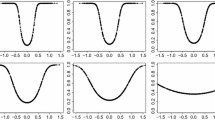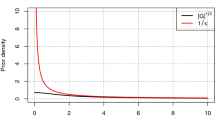Abstract
In many statistical problems we deal with more than one model. When the prior information on the parameters of the models is vague default priors are typically used. Unfortunately, these priors are usually improper provoking a calibration problem which precludes the comparison of the models. An attempt for solving this difficulty consists in using intrinsic priors, introduced in Berger and Pericchi (1996, The intrinsic Bayes factor for model selection and prediction. J Am Stat Assoc 91:109–122), instead of the original default priors; however, there are situations where the class of intrinsic priors is too large.
Because of this we propose prior distributions for model selection that are solutions of a system of integral equations which is derived to calibrate the initial default priors. Under some assumptions our integral equations yield a unique solution. Some illustrative examples are provided.
Similar content being viewed by others
References
Berger JO, Pericchi LR (1996) The intrinsic Bayes factor for model selection and prediction. J Am Stat Assoc 91:109–122
Bernardo JM (1979) Reference posterior distribution for Bayesian inference. J Roy Stat Soc Ser B 41:113–147
Cano JA, Kessler M, Moreno E (2004) On intrinsic priors for nonnested models. Test 13(2):445–463
Diebolt J, Robert CP (1994) Estimation of finite mixture distributions by Bayesian sampling. J Roy Stat Soc Ser B 56:363–375
Eaton ML (1992) A statistical dyptich: admissible inferences—recurrence of symmetric Markov chains. Ann Stat 20:1147–1179
Hobert JP, Robert CP (1999) Eaton’s Markov chain, its conjugate partner and P-admissibility. Ann Stat 27:361–373
Jeffreys H (1961) Theory of probability. Oxford University Press, London
Liu JS, Wong WH, Kong A (1994) Covariance structure of the Gibbs sampler with applications to the comparisons of estimators and sampling schemes. Biometrika 81:27–40
Meyn SP, Tweedie RL (1993) Markov chains and stochastic stability. Springer, New York
Moreno E, Bertolino F, Racugno W (1998) An intrinsic limiting procedure for model selection and hypotheses testing. J Am Stat Assoc 93:1451–1460
Pérez JM, Berger J (2002) Expected posterior prior distributions for model selection. Biometrika 89:491–512
Robert CP (2001) The Bayesian choice, 2nd edn. Springer, New York
Smith AFM, Spiegelhalter DJ (1992) Bayes factors for linear and log-linear models with vague prior information. J Roy Stat Soc Ser B 44:377–387
Author information
Authors and Affiliations
Corresponding author
Additional information
This work has been supported by the Research Training Network, DYNSTOCH, under the Fifth Framework Program of the European Commission, and by the Spanish MCYT grant DPI2001-0469-C03-01.
Rights and permissions
About this article
Cite this article
Cano, J.A., Salmerón, D. & Robert, C.P. Integral equation solutions as prior distributions for Bayesian model selection. TEST 17, 493–504 (2008). https://doi.org/10.1007/s11749-006-0040-8
Received:
Accepted:
Published:
Issue Date:
DOI: https://doi.org/10.1007/s11749-006-0040-8




